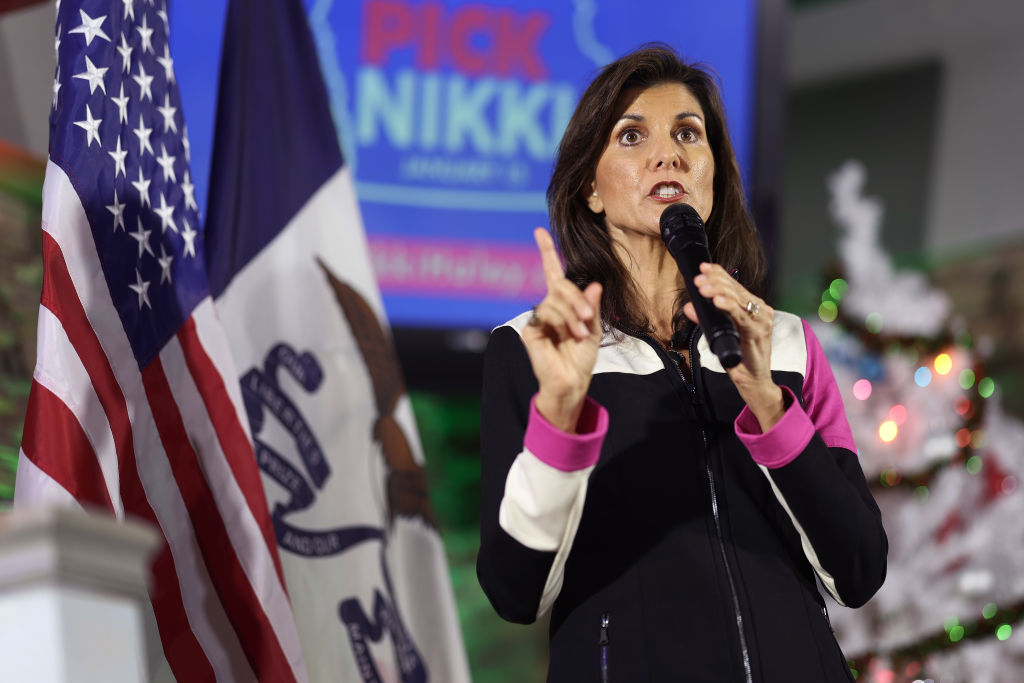A new and consequential year in politics begins as we all hoped, with both sides chattering inanely about slavery.
The chatter isn’t symmetrical. On the left, the debate consists of Very Online progressives with social-media brain damage insisting that the authors of the 13th Amendment were actually trying to legalize slavery and sane liberals replying, “What?”
Whereas on the right, the second-highest polling candidate in the Republican presidential primary couldn’t bring herself to utter the S-word when asked recently about the causes of the Civil War. When a politician as smart and savvy as Nikki Haley misses a layup as easy as that, it isn’t an accident.
Break out the oil and vinegar, because we’re bingeing on word salad today. It began last Wednesday:
“In the year 2023, it’s astonishing to me that you answered that question without mentioning the word ‘slavery,’” the questioner said to her at the end. It wasn’t the first time she’s done it, though:
“Tradition versus change” is an awfully high level of abstraction from which to describe the politics of the Civil War, but that seems to be Haley’s go-to maneuver whenever she’s put on the spot about this. Watch her response on Thursday when reporters asked her about what she’d said the day before. Now under pressure, she frankly admits the role of slavery in the war—before pivoting quickly to gassy platitudes about freedom and government:
“Government shouldn’t tell people what they can and can’t do” is a fine conservative message, but the Civil War is a strange example to illustrate the point. There was one very specific thing white Southerners wanted to do, after all, and the U.S. government ultimately made sure they couldn’t do it, never mind what those brain-damaged, Very Online progressives might tell you. And all decent people are glad that it shook out that way.
Word salad remained on the menu at Haley events in New Hampshire after her slavery gaffe, occasionally drawing jeers from attendees. The candidate grumbled during an interview that the original question must have been posed by a “Democratic plant” but, if so, her Republican rivals for the presidency appeared to share that Democratic sensibility. Chris Christie scoffed at her “tradition versus change” nonsense during one of his own events, while Team DeSantis pummeled her with post after post about the controversy, even satirizing the moment with faux campaign merchandise. Ron DeSantis himself came off as a beacon of moral clarity by comparison when addressing the subject:
It’s not often that post-liberals get to scold traditional conservatives for their civic blind spots, particularly ones who’ve employed staffers prone to sneaking white supremacist symbols into campaign propaganda.
Why did Haley blow the layup?
No one believes Nikki Haley is privately sanguine about the evils of slavery. Even Christie went out of his way to absolve her of racial prejudice while criticizing her. She is, after all, the governor who ordered the Confederate battle flag removed from the statehouse grounds after the Charleston racial massacre in 2015.
Without exception, the commentary I’ve seen about this episode has theorized that she said what she said because she was pandering. The Haley gaffe is less about Nikki Haley, it’s universally agreed, than it is about Republican voters. But why would Republican voters, or some meaningful cohort among them, need to be pandered to on this subject?
One easy answer is geography. Haley was born and raised in South Carolina, went to school in South Carolina, made her name in South Carolina politics, and therefore is forever mindful of certain South Carolinian … sensitivities. When you’re looking to get ahead in the state where the Confederates fired their first shot at the Union, you might take care not to remind the white majority too often of what their ancestors deemed morally acceptable. Especially if you’re not white yourself.
So instead of saying the war was about the locals’ comfort with institutional racist brutality and degradation, maybe you get in the habit of saying it was about, er, “tradition versus change” instead.
In a party that’s overwhelmingly white and whose center of political gravity lies in the South, it’s understandable why that attitude might color Haley’s approach to the issue even in a national presidential primary. Polls of other Southern states have found Republicans far more likely than the general population to support leaving monuments to the Confederacy in place, for instance. And a YouGov survey taken this past summer saw less than 50 percent of Southerners say they would have supported the North in the Civil War if given a choice to do so. Subtract African Americans from that sample and the percentage would doubtless be lower.
Not all of that is perniciously motivated; part of the impulse driving these polling results is simple regional loyalty, surely. But it’s a political fact of life with which Haley has had to contend for her entire career. Go figure that the lessons she learned about walking on eggshells around the topic of slavery back home weren’t instantly abandoned once she became a national candidate.
And don’t forget that South Carolina isn’t just a part of her past, it’s part of her future. If she manages to beat Donald Trump in New Hampshire, her home state’s primary electorate will hold the fate of her presidential hopes in its hands. Under those circumstances, it’s not irrational for her to calculate that the Democrats and independents whom she’s wooing up north will forgive her a small pander to the Lost Cause that might remind voters in South Carolina that she’s still one of them.
There’s something else going on, though.
My friend Jeff Blehar wrote smartly about the Haley incident last week at National Review but this passage brought me up short:
What insults about it is that—lost in rote accusations of “racism blah blah GOP base blah blah”—we will avoid discussion of Nikki Haley’s real sin: holding her voters either in such contempt, or fear, that she can’t confidently state a simple truth. The real gaffe Haley committed on Wednesday was that, when she froze up under an unpredicted question and defaulted to her factory settings in answering, those answers demonstrated such contempt for the intelligence of her voters. We can be told the Civil War was about slavery, Nikki—we’re all adults here. Few politicians look good when caught nakedly pandering in public, but Nikki Haley wears the look witheringly poorly—it knocks out one of the key underlying struts currently upholding her fragile public brand. That’s why this little gaffe, however minor, memorably reveals something about Haley; we rarely get such accidental insight into how little politicians think of their own voters.
“We can be told the Civil War was about slavery, Nikki—we’re all adults here.” As Tonto said to the Lone Ranger: What do you mean “we,” Kemosabe?
I believe the writers and readers of National Review, not to mention The Dispatch, are “all adults here.” But is the same true of an electorate that’s given a 50-point lead in national polling to a man facing almost 100 criminal charges, some of them stemming from an attempt to overthrow the government?
Chris Christie has spent the better part of a year treating Republican voters like adults by telling them unpleasant truths about the frontrunner:
His net favorability rating among those voters at last check was … -53 percentage points.
“We” are not the same as the rank-and-file voters of this party. If the Republican base thought like the staff of National Review, the GOP wouldn’t be in the predicament it’s in. (DeSantis would lead by 85 points.) As things stand, it’s no exaggeration to say that the way to get ahead in right-wing politics in 2024 is not to treat voters like adults. Adults can cope with accurate information that confounds their world view; they don’t need to be reassured constantly that their candidate secretly won the last presidential election and that the riot at the Capitol was a false-flag operation. Adults treat politics as a contest of ideas about how best to govern, not as a spectacle in the vein of pro wrestling in which the most pugnacious performers are the biggest stars.
I think Haley, quite understandably, isn’t sure anymore what right-wing populists will and won’t tolerate and therefore is forever erring on the side of caution when it comes to offending them. She won’t attack Trump’s character. She won’t use his indictments against him. She won’t even say that he “causes chaos,” opting for the more passive “chaos follows him.” An adult electorate would take those critiques in stride, warranted as they are, but the GOP electorate treats them as disqualifying, as Christie might tell you. The two recurring themes of this newsletter, in fact, are that the Republican base has effectively subcontracted its civic conscience to Trump and that, from protectionism to supporting Ukraine to consensus on abortion, no one’s quite sure what it means to be a Republican anymore. That’s a lot of uncertainty and moral corruption for a politician to have to navigate.
If it’s true, then, that Nikki Haley feels “unease” about GOP voters and is leery about finding out the hard way where their racial-resentment red line lies with respect to slavery and the Civil War, well, she should. Although I’d also say that if advancing within a political party requires you to avoid offending the Confederacy, you probably shouldn’t be a member of that party.
Haley is still a member, though, and in order to lead the party she’ll have to make considerable inroads with populist Republicans across the country. She can’t win by consolidating normie conservatives and center-right moderates, as there aren’t enough of either left to form a majority. Somehow she needs to make herself acceptable to “soft” Trump voters, the sort who demand a “fighter” as nominee but are willing to hear out pretenders to the throne like her and DeSantis.
For just that reason, Trump diehards like Steve Bannon and Donald Trump Jr. have begun to attack her lately as an establishmentarian who’s unfit to share a ticket with their hero. They’re sending a message to those same “soft” Trump voters who might otherwise find themselves Haley-curious as she creeps up in the polls that she has no place in a party that’s been remade in Trump’s image. She’s a squish who’s destined to let them down.
Her initial answer about the cause of the Civil War was a ham-handed attempt to negotiate that dynamic, I think. Perhaps the boring conventional answer about slavery would have been good enough—or perhaps she would have been attacked opportunistically for engaging in “woke” reductionism, demonstrating just the sort of politically correct squishy sensibility that Bannon and Trump Jr. have complained about. In the incredibly stupid politics of populist virtue signaling, it’s anyone’s guess if endorsing the historical consensus over the “Lost Cause” narrative of the Civil War would have made her more unacceptably “establishment.”
DeSantis could get away with the conventional answer about slavery because he’s spent three years accruing populist credibility and now has the opposite political problem Haley has—he desperately needs to make inroads among her base of “normies” before Iowa in order to gain on Trump. Having proven himself repeatedly to be a “fighter,” the governor of Florida can afford not to fight the historical consensus about what caused the Civil War. On the contrary, endorsing the consensus might please those centrist Republicans he’s eyeing by signaling that he’s a bit more acceptably establishment than they thought.
Haley, the so-called RINO, lacks the same credibility and probably feared she wouldn’t get the same amount of grace from populists for taking the same position. So she declined to say the S-word. Then, when she was inevitably attacked for it, she had to say it anyway, guaranteeing that she’d ultimately annoy everyone. That was uncharacteristically clumsy of her.
She’s gotten very far in politics, though—even outperforming DeSantis this year—by being a well-lubricated weathervane who knows which of the right’s buttons can and can’t be pushed. The fact that Nikki Haley, in a gut-check moment, felt obliged to be respectful of Confederate fee-fees says a lot about where she thinks the balance of political power in the party lies. And none of it is good.
We’re 13 days from caucus night in Iowa. If you had to bet on the outcome of this primary right now, you’d wager heavily on the twice-impeached, four-times-indicted coup-plotter running the table and clearing the field no later than South Carolina. He might win every race by no less than 25 points.
So it’s very late in the game for anyone to still be defending the sound judgment and adult sensibilities of the noble Republican electorate. “We” are not all adults here.
In fact, I don’t think there’s a “we” at all. There’s the Trumpist majority that’s poised to rout the field in a few weeks, and then there’s the rest of us who’ll find that mortifying. I encourage those in the latter group to think hard on that outcome in the aftermath and consider whether there’s any “we” worth preserving. And, if there is, what sort of momentous civic sacrifices might need to be made to do so.
The most revealing thing Haley said in all of this, I believe, was when she accused the person who asked her about slavery of being a “Democratic plant.” The fact that posing a question about something as basic as the cause of the Civil War might plausibly be framed as a dirty trick by the opposing party is, I dare say, the whole problem. That damned lib knew there was no answer I could give that wouldn’t get me in trouble.
But it’s plausible, isn’t it? Because there’s no “we” anymore, and because no one’s quite sure how deep and broad the reactionary element on the right has become, it really does feel like a gotcha question insofar as her answer was destined to offend some faction or another. In the end, rather than take a firm position, all she could think to do with a hot potato about slavery was to toss it at the left in hopes of rejoining the right’s great tribal “we.”
It’s not going to pay off for her by making her the GOP nominee, but it might impress the guy who will be, who is a well-known fan of revisionist narratives about his own defeats. Trump-Haley 2024: Because no great Cause is ever truly Lost.







Please note that we at The Dispatch hold ourselves, our work, and our commenters to a higher standard than other places on the internet. We welcome comments that foster genuine debate or discussion—including comments critical of us or our work—but responses that include ad hominem attacks on fellow Dispatch members or are intended to stoke fear and anger may be moderated.
With your membership, you only have the ability to comment on The Morning Dispatch articles. Consider upgrading to join the conversation everywhere.